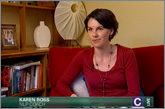
Overcoming Stage Fright
Every now and then another poll is taken of what people fear the most, and fear of public speaking inevitably ranks in the top ten. It ranked in the top three of Gallup polls run in 1998 and 2001, where over 40% of Americans reported a fear of public speaking. Reactions can vary from mild nervousness to blind terror at the very thought of it.
A fear like this can effect how we feel before and during:
- Conferences
- Job interviews
- Contributing to or leading meetings at work
- Media interviews
- Wedding speeches
- Special events and award ceremonies
- Presentations
- Meetings/negotiations with banks or lawyers
- Meeting people for the first time (including the in-laws!)

When I'm working with clients on this issue, they may report:
- Fluttery tummy through to nausea
- Blushing
- Shaky hands
- Sweaty palms
- Elevated heart rate and body temperature
- Talking too fast
- Wobbly voice
- Speaking too quietly
- Tense shoulders, or whole body
- Mind all over the place, or completely blank
- Feeling dread about doing it
- Talking to themselves about "What if I screw up?"
- Feeling judged "They don't want to hear what I have to say"
- Afraid of being asked questions or of being challenged
- Procrastinating about preparing
Thankfully the technology of NLP means we know why one might react like this, and how the responses can be changed. Let's look at it through the eyes of movie watching. Most of us have had the experience of watching a fictional film or television show that caused us to feel emotional - afraid, anxious or even sad. We have the response even though we know it's not real. I recently took myself off to the movies to see the new Batman film, The Dark Knight.
I hadn't seen an action/thriller style film for a while and I was amazed at the roller coaster ride of adrenalin I found myself on. Rolling Stone online describes the movie as "a shock to the system." I have to agree! I had adrenalin pumping through my body, felt tense all over and my heart rate was higher than usual. And yet I knew it wasn't real, that the Joker's face was covered in make-up and so on.
Why does this happen even when we know it's make-believe? Because all behaviour is unconscious (sub-conscious), and the unconscious mind doesn't know the difference between what is real and what is imagined. When you imagine biting into a wedge of lemon, you can almost feel the sour tang in your mouth and more saliva being produced. But you're not eating the lemon!
So it is with public speaking. For many, just imagining speaking in front of people that makes them nervous! And once they're in front of their audience, focusing on what could go wrong or how nervous they are, also causes their body to tense up in an adrenalin frenzy and quake with fear. The unconscious mind thinks it's a scary dangerous situation, so it's responding accordingly.
Even when we know everything about the topic we are presenting, we can falter. Recently one of my clients was saying how intellectually she knows that what she is saying is right. However, her body is (unconsciously) behaving as if she doesn't. (Well it was - past tense!) After our work together she not only presents confidently, she actually enjoys it.

A wedding is such a special experience, and for some brides and grooms all the formalities involved can be somewhat anxiety-producing. NLP can help you feel relaxed and at ease throughout the ceremony and speeches, allowing you to thoroughly enjoy the whole of your special day.
So how can we feel relaxed, focused, in the moment and fully present in our bodies as we enjoy speaking or presenting? Since the current responses are running unconsciously, this is the level at which we want to be able to make changes. Using simple techniques from NLP this is easy, quick and lasting.
When I'm working with a client, I will help them work out what they want to be doing instead (set an outcome), what their current patterns and responses are, and then teach them how they are able to make unconscious changes. Then we will go through one or several processes that could include techniques such as visualisation, changing internal dialogue (yes, it's perfectly normal to talk to yourself!), hypnosis, etc. It's usually a fascinating, fun journey that clients find delightful.




